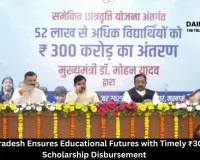MP High Court Clears ‘Haq’ for Release, Dismisses Shah Bano Family Petition
Digital Desk
The Indore Bench of the Madhya Pradesh High Court on Wednesday cleared the path for the release of the film Haq, dismissing a petition filed by Shah Bano’s family. The court’s ruling allows the film, produced by Junglee Pictures, to release as scheduled on November 7, 2025.
The petition, filed by Shah Bano’s daughter, Siddiqua Begum Khan, sought to restrain the screening, promotion, and release of the movie. The petitioner claimed that Haq, which depicts the life of her late mother, dramatizes personal and matrimonial details without consent, amounting to commercialization of a personal tragedy and a violation of her mother’s dignity.
Senior advocate Ajay Bagadia, representing Junglee Pictures, argued that Haq is a fictional adaptation inspired by the book Bano: Bharat Ki Beti by journalist Jigna Vora, as well as the 1985 Supreme Court judgment in Mohd. Ahmed Khan vs. Shah Bano Begum. The defence highlighted that the film:
-
Holds a UA 13+ certification from the Central Board of Film Certification (CBFC).
-
Features a clear disclaimer stating that all characters and events are fictional.
-
Is based on publicly available records, not private information.
-
Does not require consent from the petitioner, as personality rights are not heritable.
Justice Pranay Verma observed that privacy and reputation rights expire upon death and cannot be claimed by legal heirs. He noted that the film falls within the ambit of artistic and creative freedom under Article 19(1)(a) of the Constitution and that the petitioner had alternate legal remedies under the Cinematograph Act but had not pursued them in time.
Finding no procedural lapse, defamation, or violation of rights, the court dismissed the petition as lacking merit. The ruling provides a significant relief to the producers, ensuring Haq will release nationwide tomorrow, exploring sensitive topics such as Muslim Personal Law and the Shah Bano case through a courtroom drama narrative.
This verdict reinforces the judiciary’s stance on balancing creative freedom with personal rights, setting a precedent for fictional works inspired by real events.











